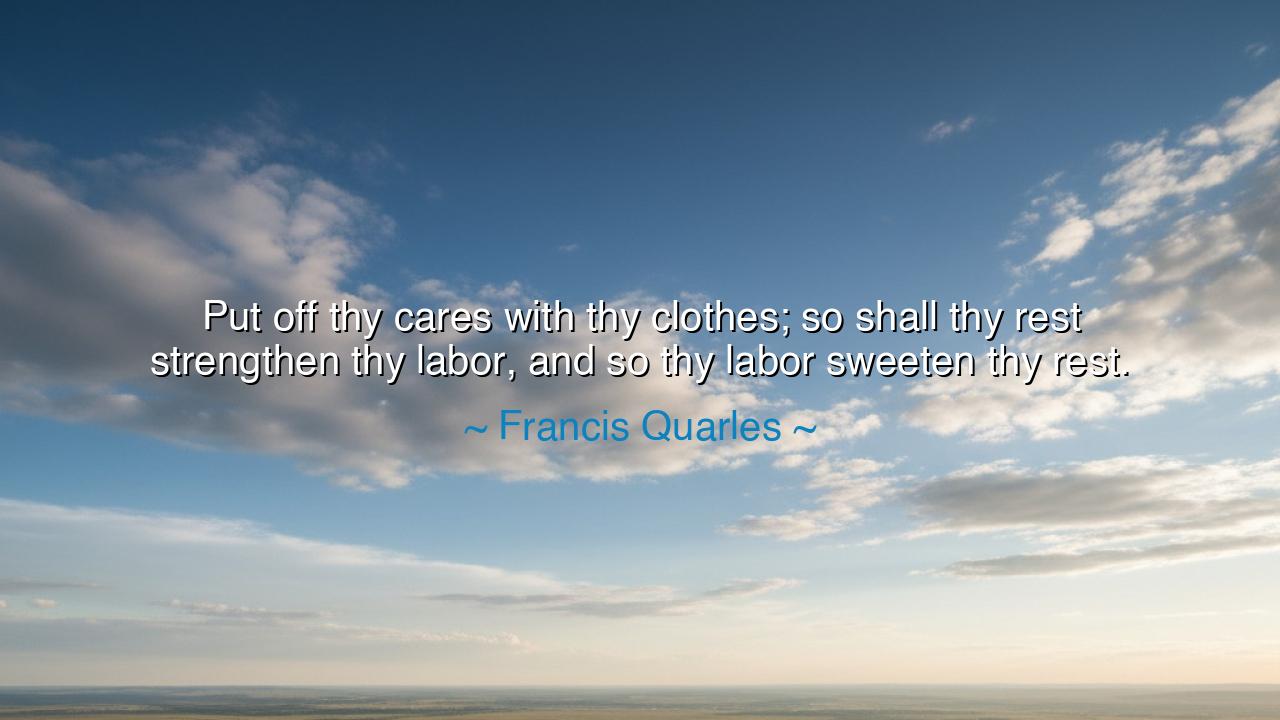
Put off thy cares with thy clothes; so shall thy rest strengthen
Put off thy cares with thy clothes; so shall thy rest strengthen thy labor, and so thy labor sweeten thy rest.






Francis Quarles, poet of devotion and wisdom, once counseled: “Put off thy cares with thy clothes; so shall thy rest strengthen thy labor, and so thy labor sweeten thy rest.” In this saying lies the eternal rhythm of work and rest, each sustaining the other as day sustains night. To cast aside cares when laying down to sleep is not idleness, but wisdom, for the soul that clings to its burdens finds no renewal, and the body that knows no renewal falters in its labor.
The ancients also honored this cycle. They taught that the warrior who returns from battle must set aside his sword, the farmer his plow, and the sailor his oar, lest exhaustion consume them. To release the weight of care is to honor the limits of flesh and spirit, and to prepare the body for fresh strength at dawn. In this balance, rest becomes not weakness but the silent ally of endurance.
Quarles reminds us that labor itself becomes sweeter when it follows true rest. The mind unburdened rises sharper; the body refreshed moves with vigor. And likewise, rest becomes sweeter after toil, for slumber is never so deep, nor dreams so satisfying, as when they come upon one who has labored honestly with heart and hand. Thus each sanctifies the other, and both together weave the fabric of life.
This teaching also carries a deeper, spiritual note. To put off cares with thy clothes is to practice detachment, to trust that the world can wait, that Providence governs what we cannot. Such surrender allows the spirit to recover its strength, so that when labor calls again, it may be faced not with dread but with dignity. In this way, sleep itself becomes an act of faith.
Let the generations remember: rest is not escape, but preparation; work is not punishment, but fulfillment. To know when to labor and when to lay aside care is the mark of wisdom. As Quarles teaches, the sweetness of life is found not in work alone, nor in rest alone, but in the harmony of both, each blessing the other, until the days and nights flow as one unbroken hymn.






HCNguyen thi hoang chau
I love the idea behind this quote—it emphasizes that rest is not just about taking a break, but about shedding the weight of the day. When we allow ourselves to truly rest, we come back to work refreshed and more capable. But how often do we allow ourselves this kind of rest? Do we actively engage in practices that help us leave our stresses behind, or do we unknowingly carry them with us?
FHvo fuan hung
This quote really made me think about how interconnected rest and work are. It’s almost as though true rest not only refreshes us but enhances our productivity. But can we really turn off our cares so easily? What does it take to fully relax and recharge so that our work feels more fulfilling? I wonder if we truly take the time to rest in a way that prepares us for more productive and meaningful work.
-K-T K-A
Quarles’ quote resonates with me because it touches on the concept of balance. Rest isn’t just about stopping work, but also about being able to mentally and emotionally disconnect. It made me wonder: can we truly experience the fullness of rest if we don’t intentionally release our cares? What are some ways we can more effectively ‘put off’ our worries, especially in today’s fast-paced world?
EKEm Kieu
I find this quote fascinating because it suggests that rest isn’t just about physically relaxing—it’s about mentally letting go. How often do we bring our worries into our downtime, even when we’re physically not working? Is the real challenge in achieving true rest about how well we can detach ourselves from our daily concerns? How do you separate your work-life stress from your home life, if at all?
VANguyen Van A
This quote really speaks to the importance of mental and physical separation between work and rest. Quarles suggests that by shedding our cares, even symbolically through our clothes, we can truly rest and recharge. Do you think it’s possible to leave work behind when we step into our homes? How do we create a clear boundary between work and relaxation in our lives without letting stress seep into our personal time?